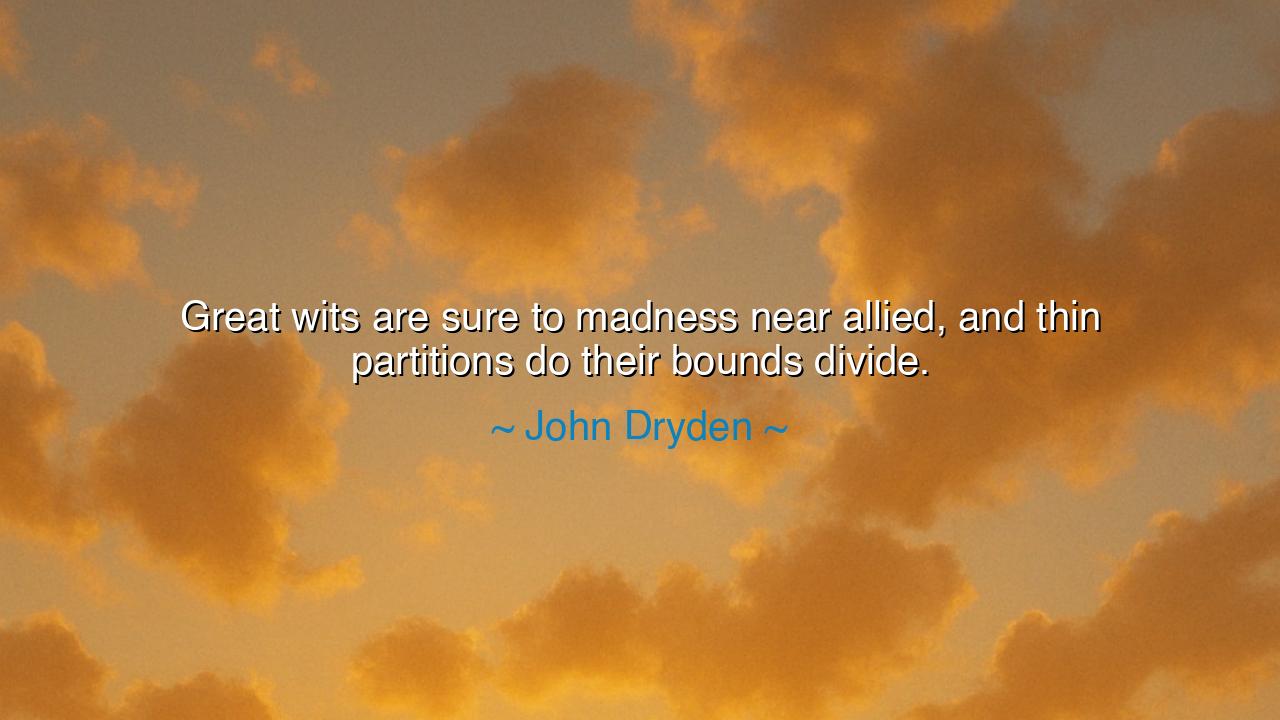
Great wits are sure to madness near allied, and thin partitions
Great wits are sure to madness near allied, and thin partitions do their bounds divide.






In the immortal words of John Dryden, poet of insight and fire, we encounter a truth that walks the edge of mystery: “Great wits are sure to madness near allied, and thin partitions do their bounds divide.” In this single line, he unveils the fragile frontier between genius and madness, between the soaring mind and the breaking one. It is a line both fearful and reverent—a recognition that the brightest flames of thought burn perilously close to the fire that consumes. For in every age, the world has seen that those who reach furthest into the unknown often walk a trembling path where reason and chaos entwine.
The origin of this saying comes from Dryden’s 1681 work, Absalom and Achitophel, a political satire written in the age of kings and intrigue. Yet his words transcend politics; they speak of the nature of human creativity itself. Dryden had lived among artists, thinkers, and dreamers, and he knew that great intellect and deep feeling are twin forces—one seeking truth, the other daring to imagine it. But when these two grow too close, the mind teeters on the brink of ungoverned passion. Thus he wrote that the partition between wit and madness is “thin,” as delicate as glass, and just as easily shattered.
The ancients themselves bore witness to this truth. The philosopher Aristotle observed that “No great genius has ever existed without a touch of madness.” To him, the same divine fury that inspired poets and prophets could, if uncontrolled, drive them to despair. The Greeks believed such inspiration came from the gods—from Dionysus, god of ecstasy, or Apollo, god of vision—and that those chosen to receive it were both blessed and burdened. For to see beyond the ordinary world is to risk losing one’s footing in it. The gift of insight, like a blade, cuts both ways.
Consider the life of Vincent van Gogh, whose art pierced the veil of perception itself. His colors blazed like the voice of heaven, his brush captured the trembling life of the stars, and yet his soul was tormented beyond measure. In him, the boundary between creation and collapse grew perilously thin. He painted not from comfort, but from an agony transformed into beauty. His madness did not erase his genius—it revealed the terrible cost of perceiving the world too deeply. Dryden’s line becomes prophecy in his life: the mind that sees too much may suffer beneath the weight of its own light.
And yet, this nearness between wit and madness is not only a danger—it is also a divine tension. For without passion, there is no art; without daring, there is no discovery. The inventors, the prophets, the poets—all walk where others fear to tread. Their visions, though wild, are what lift humanity beyond its limits. The world needs such souls—the ones who dance on the edge of order and chaos—so that progress may continue. Dryden’s wisdom is not a warning to flee from genius, but to honor the balance that sustains it. The flame must burn, but it must also be tended.
The meaning, then, lies in the acknowledgment that human brilliance is born from both light and shadow. The same imagination that conceives of beauty may also descend into despair if left unmoored. It is a call to discipline, to the harmony of intellect and spirit. The mind must be free to dream, but also anchored by reason, compassion, and humility. The ancients called this balance sophrosyne—the temperance that keeps divine fire from turning to destruction. The wise creator learns not to extinguish the flame, but to shape it, that it may illuminate rather than consume.
The lesson, therefore, is this: guard your mind, even as you let it soar. Do not fear your passions, but learn to guide them. If you are gifted with imagination, ground it in purpose. If you are burdened with vision, temper it with care for your soul. Genius, like lightning, is both power and peril—it can light the night, or burn the world. The choice lies in how one tends the fire within.
So, my listener, take to heart the wisdom of John Dryden. Remember that great wit and madness are neighbors, divided only by a thin wall of self-awareness and grace. Walk boldly along that narrow line, but never alone; let friendship, faith, and humility steady your steps. For those who balance their brilliance with wisdom will not fall into madness—they will rise into immortality, their light enduring long after the fire has passed.






AAdministratorAdministrator
Welcome, honored guests. Please leave a comment, we will respond soon